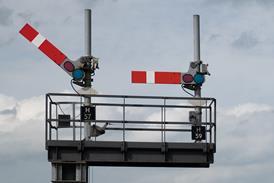AT THE annual general meeting in May 2003, an attempt by the Paris-based Eurotunnel Shareholders Action Group (Adacte) to seize control of the Channel Tunnel operator failed.
Despite the antics of their eccentric leader Nicolas Miguet - who was fined €10000 on February 17 for publishing ’remarks systematically filled with abuse’ aimed at Eurotunnel’s Chief Executive Richard Shirrefs - nobody is assuming that a second attempt on April 7 this year will also fail.
Alongside the 2004 AGM there will be a special general meeting, chaired by an official of the Paris Commercial Court, where Adacte will try to appoint seven directors to form a new board. All are French, and as Shirrefs pointed out in a letter to shareholders on March 19, ’they have no railway competence, they have no industrial competence, and above all they have no strategy.’
The 11 existing directors are taking the threat very seriously indeed, because most institutional investors have pulled out leaving around 60% of the 2·08 billion units (twinned shares in Eurotunnel SA and Eurotunnel plc) in the hands of French individuals. The joint board’s position is fully supported by the UK and French consultative committees of Eurotunnel shareholders.
Indeed, the French committee describes Adacte’s belief that the governments will step in with ’financial support’ as ’a surrealistic idea, since they do not seem to have taken into consideration the restrictions imposed by the Treaty of Canterbury and the European Commission in Brussels, which prohibit all public financing’.
Adacte has recently shelved its plans to demand subsidy from the two governments, and to tell the banks that the company will no longer service its £6·4bn debt. Instead, Adacte would look for ’ways in which the weight of debt can be reduced globally’ - as if Eurotunnel had not been striving for years to do just that. As the directors point out, defaulting on debt service would trigger ’substitution’ provisions in the loan agreements enabling the creditor banks to take direct control of the Tunnel, causing shares ’immediately to lose all their value.’ n




















